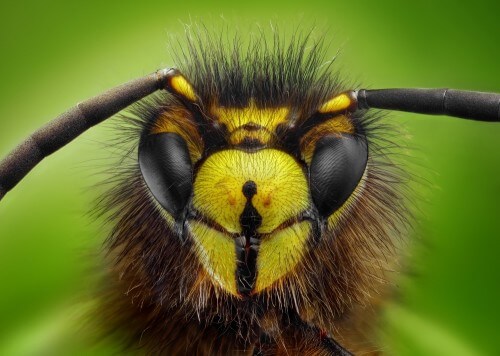The parasitic wasps were developed and bred at the Bio-B company in Kibbutz Sde Eliyahu, which specializes in cultivating beneficial insects for use in biological warfare in agriculture. They are sent abroad when they are in the pupal stage

160 million parasitic wasps were sent from Israel to South Africa in order to protect agricultural crops from pests. The Israeli wasps are distributed in vineyards and orchards and eliminate the mealybugs in a natural way, thus eliminating the use of harmful pesticides.
The parasitic wasps were developed and bred at the Bio-B company in Kibbutz Sde Eliyahu, which specializes in cultivating beneficial insects for use in biological warfare in agriculture. They are sent abroad when they are in the pupa stage, when the larva develops into a wasp inside a harmful aphid which they eliminated and devoured its internal tissues. The body of the aphid serves as a shield and shelter for the young larvae, which eases the hardships of the journey and allows them to arrive fresh and strong to their new home. The South African farmer receives closed boxes containing the corpses of aphids and wasp larvae. All he has to do is open them and place them near where the pests are. About 500 parasitic wasps are released from each box that begin the task of eliminating the aphids and even raise generations of offspring that continue to protect the crops from pests.
The delivery of the wasps is done through a joint subsidiary with the Israeli Heshtil Nursery, which has been operating in South Africa for 9 years, and a local agricultural company. Hishtil operates two nurseries in South Africa and has become a major supplier of South African farmers, thanks in part to the assembly technology - a connection between a tomato seedling and a strong root system that produces seedlings that are resistant to diseases and pests. The composite seedlings allow farmers to reduce the use of pesticides.
The expansion of Israel's agricultural activity in South Africa has resulted in the fact that every second tomato sold in this country today began its journey in one of the nurseries in an Israeli partnership. Some of the produce is exported to the neighboring countries of Namibia, Botswana, Zimbabwe and Mozambique.

3 תגובות
You are welcome to view photos from a similar treatment process, the size of the wasp and the aphid is a few millimeters.
You can see the wasp's stealth, the sting, and the exoskeleton left by the aphid after the larva has finished eating it from the inside.
http://www.aimishboy.com/aphid–parasitic-wasp.html
A wasp of this type will only lay its eggs inside an aphid of the type it is intended for.
If the aphid in question is an invader - there is no problem that the wasp will spread, when the aphid disappears, the wasp will also disappear.
If the aphid is also found naturally in South Africa, it is a matter of balance.
For that matter, if we had an ultimate predator capable of destroying all mosquitoes - even if it is a certain harm to the ecology - we would probably use it to destroy them anyway, because of the enormous damage caused by mosquitoes.
By and large, it is true that you don't want to damage the natural ecology, but it doesn't mean that there aren't exceptions.
You also don't see anyone who wants to return lions to the wild in southern Europe - it is likely that they will also kill humans from time to time, and very quickly someone will destroy them that way, even if they were originally there naturally.
How do you ensure that the wasps will not harm non-harmful species, or spread to natural areas and become an invasive species